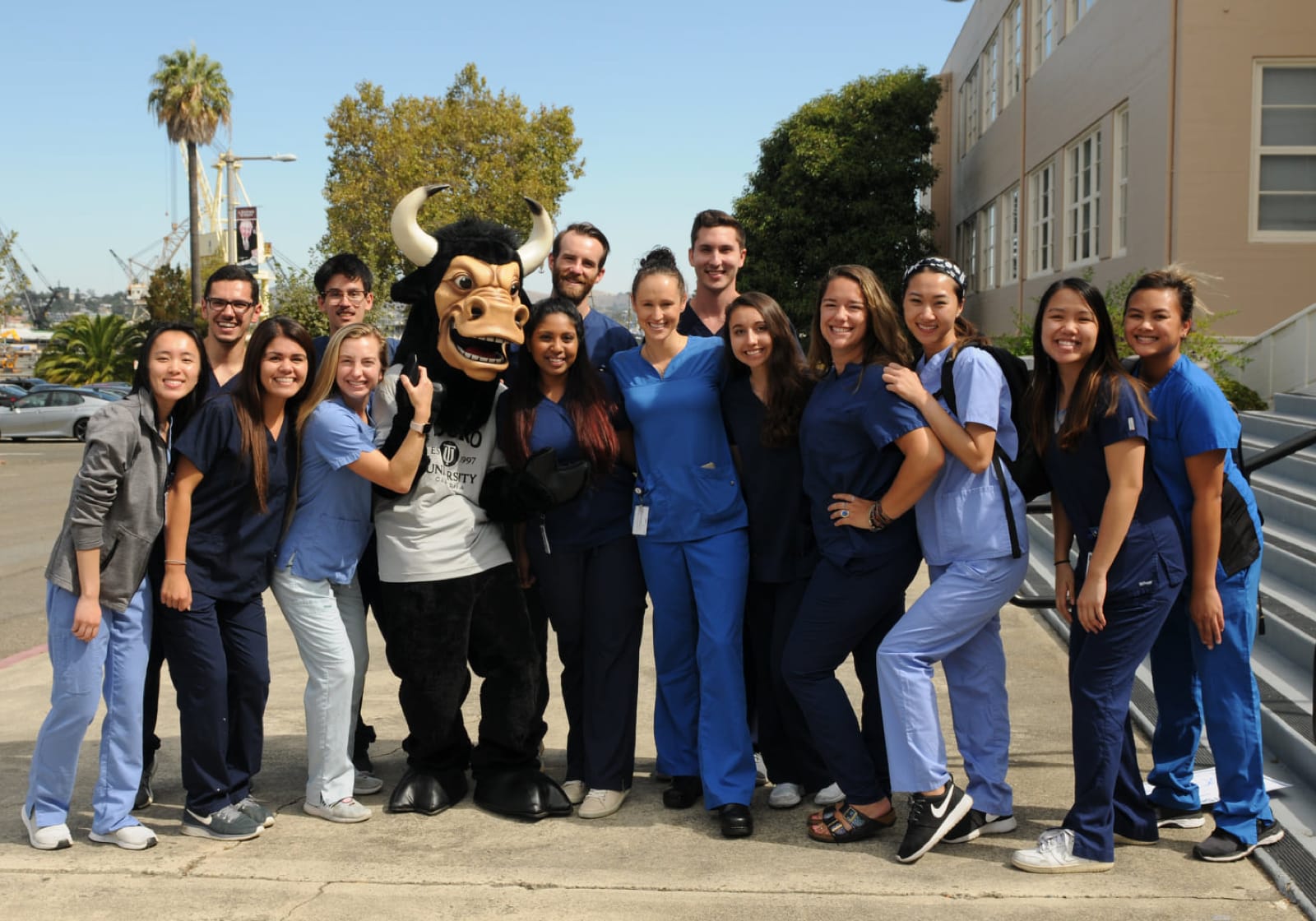
About
Be everything you want to be and more.
Our Joint MSPAS/MPH Program is uniquely supportive and comprehensive. In Touro's one-of-a-kind program, you'll earn a second master's in Public Health — all in less than 3 years.
Vision, Mission & Values
In our joint MSPAS/MPH program you'll graduate with a special combination of knowledge and understanding. The integration of TUC's MSPAS and MPH degrees provides our graduates with the skills to assess both the individual and the community in which they live. That means you'll not only achieve your PA dream, but you'll be able to further benefit those you serve with a public health focus.
Vision
Educating caring Physician Assistants to Serve, to Lead, to Teach.
Mission
The mission of the Joint MSPAS/MPH Program is to:
- Recruit applicants and educate PAs committed to public health and community service.
- Increase access to high-quality care with an emphasis on primary care.
Values
The Touro California Joint MSPAS/MPH Program values:
- Primary care as the backbone of the U.S. healthcare system to achieve positive health outcomes.
- Caring for patients with a public health lens
- Clinicians who are empathetic professionals who provide patient-centered, and evidence-based care to all patients as part of an interprofessional team.
Our Goals
The Goals of the Joint MSPAS/MPH Program are to:
Emphasize personal wellness to combat burnout by:
Organize well-being activities thereby modeling to students the need to emphasize personal wellness to combat burnout:
- Organize 3 events throughout the year for our students with a focus on wellness and encourage them to participate by accommodating the didactic schedule.
Data:
- 2025: We have exceeded 3 events for the 2025 academic year.
- 2024: We have exceeded 3 events for the 2024 academic year.
- 2023: We have exceeded 3 events for the 2023 academic year.
Meet or exceed three clinical rotations within:
The cohort will meet or exceed an average of three clinical rotations to be within medically under-resourced areas or with medically underserved populations such as sites designated as Health Resource& Service Administration (HRSA) rural, Federally Qualified Health Center (FQHC), Medically Underserved Areas (MUA) or Indian Health Service (IHS).
- Cohorts will, on average, rotate through 3 clinical sites designated as HRSA rural, FQHC, MUA, or IHS.
Data:
- Class of 2025: Averages 3 rotations
- Class of 2024: Averages 4 rotations
- Class of 2023: Averages 4 rotations
- Class of 2022: Averages 4 rotations.
Meet or exceed the average first-time PANCE pass rate:
Meet or exceed the national average first-time pass rate on the PANCE.
Data:
- Class of 2025: We did not meet our goal. Our pass rate was 84% (National: 88%).
- Class of 2024: We exceeded our goal with a 96% Pass rate (National: 92%).
- Class of 2023: We did not meet our goal. Our pass rate was 82% (National: 92%).
- Class of 2022: We exceeded our goal with a 98% Pass rate (National: 92%).
Graduates of the program will serve the community:
Graduates of the program will serve in medically underserved communities (MUC) or Health professional shortage areas (HPSA) with rates above the national average as defined by the NCCPA certified PAs report (24.4% of Certified PAs provide care to patients in a designated HPSA or MUA – NCCPA certified PA data 2024).
Goal: 40% of our graduates will choose to work in a designated HPSA, MUA, FQHC, IHS, or Veteran serving site
Data:
Based on known employment information:
- 2025: 41% of students worked in a designated HPSA, MUA, Rural, FQHC, IHS, or Veteran serving site (71% known).
- 2024: 56% of students worked in a designated HPSA, MUA, Rural, FQHC, IHS, or Veteran serving site (100% known).
- 2023: 68% of students worked in a designated HPSA, MUA, Rural, FQHC, IHS, or Veteran serving site (91% known).
- 2022: 84% of students worked in a designated HPSA, MUA, Rural, FQHC, IHS, or Veteran serving site (98% known).
- 2021: 49% of students worked in a designated HPSA, MUA, Rural, FQHC, IHS, or Veteran serving site (98% known).
Program Competencies
Medical Knowledge
Graduates need to have a comprehensive understanding of pathophysiology, patient presentation, differential diagnosis, patient management, surgical principles, health promotion, and disease prevention.
- MK 1: Demonstrate knowledge of pathophysiologic principles of specific disease processes.
- MK 2: Demonstrate knowledge of the signs, symptoms, and physical manifestations of medical conditions.
- MK 3: Demonstrate knowledge of pharmacological and non-pharmacological principles in the management of medical conditions.
- MK 4: Demonstrate knowledge in recognizing and differentiating between acute and chronic conditions.
- MK 5: Demonstrate knowledge of preventative care principles by identifying appropriate patient education strategies, including risk factor assessment, immunization schedules, preventative screening tests, and lifestyle modification methods to reduce the incidence of preventable conditions and promote overall health.
- MK 6: Demonstrate knowledge of medical care across the lifespan including prenatal, infant, children, adolescents, adults, and elderly.
Interpersonal and Communication Skills
Graduates will demonstrate verbal, nonverbal, and written communication skills that are effective for exchanging information with patients, their families, collaborating physicians, and other members of team care team.
- ICS 1: Develop meaningful and therapeutic relationships with patients and their families by exploring their psychosocial, socioeconomic, and personal beliefs to provide culturally sensitive and patient-centered care.
- ICS 2: Demonstrate effective communication of clinical knowledge with members of the healthcare team to support collaboration, coordinated care, and optimal patient outcomes.
- ICS 3: Provide patient education that is culturally sensitive, tailored to individual needs, and considers social determinants of health to promote treatment adherence and empower patients and their families to make informed healthcare decisions.
Clinical and Technical Skills
Graduates will demonstrate the clinical and technical skills required to provide age-appropriate assessment, evaluation, and management of patients.
- CTS 1: Determine the appropriate and pertinent history and physical exam assessment for any given medical condition.
- CTS 2: Perform clinical procedures using an aseptic technique and obtain informed consent to include steps of the procedure, complications, and follow-up care.
- CTS 3: Identify appropriate laboratory and diagnostic studies and accurately interpret their results to inform clinical decision-making.
- CTS 4: Demonstrate proficiency in the use of point-of-care ultrasound (POCUS) to support clinical decision-making by identifying indications, performing examinations, and interpreting findings to enhance patient care.
Clinical Reasoning and Problem-Solving
Graduates will be able to analyze and synthesize clinical, diagnostic, and cultural information to diagnose and manage patients' healthcare needs across the lifespan.
- CRPS 1: Synthesize findings from patient history and physical examination to develop a comprehensive differential diagnosis for medical conditions.
- CRPS 2: Integrate patient history, physical examination findings, and diagnostic data to develop the most likely diagnosis for medical conditions.
- CRPS 3: Develop health management plans that incorporate pharmacologic and non-pharmacologic therapies for the treatment of acute, chronic, and emergent conditions.
- CRPS 4: Recognize acute conditions requiring immediate evaluation and intervention, and distinguish them from chronic conditions to develop appropriate, timely, and evidence-based management plans for each scenario.
- CRPS 5: Demonstrate the ability to locate, evaluate, and utilize relevant medical literature and guidelines to support clinical reasoning and interventions.
Professional Behaviors and Ethics
Graduates will demonstrate a high level of responsibility, ethical practice, sensitivity to a diverse patient population, and adherence to legal and regulatory requirements.
- PBE 1: Foster compassionate, nonjudgmental, and respectful interactions with patients and their families to build strong therapeutic relationships and ensure patient-centered care.
- PBE 2: Collaborate effectively within interprofessional teams by understanding and respecting the roles and contributions of others to enhance the quality and coordination of patient care.
- PBE 3: Demonstrate a clear understanding of medical ethics, legal aspects of healthcare, and the regulatory environment governing professional PA practice.
- PBE 4: Demonstrate a commitment to professional development and a growth mindset by identifying and acknowledging personal limitations in knowledge & skills through regular self-assessment and reflection.
Society and Population Health
Graduates will be able to recognize and understand that the influences of the larger community may affect the health of patients and integrate knowledge of social determinants of health into care decisions. Patient care includes the promotion of wellness.
- SPH 1: Incorporate knowledge of social determinants of health into patient assessments, care plans, and clinical decision-making.
- SPH 2: Reflect on how a Master's in Public Health can be leveraged to improve patient outcomes and address health challenges within the broader community.
- SPH 3: Analyze and consider the financial implications of diagnostic and treatment options in patient care.
MSPAS/MPH Leadership

Joy Moverley, DHSc, MSPAS, MPH, PA-C
Assistant Dean, College of Education and Health Sciences; MSPAS/MPH Program Director; Associate Professor
A 2012 graduate of the Touro University California Joint MSPAS/MPH Program, Dr. Moverley became Director of that same program in August 2021.
Dr. Moverley currently practices in Emergency Medicine and Diabetes Management. She is a member of the Diabetes Research, Education, and Management (DREAM) team at Touro University. She is a PA representative to the American Diabetes Association.
Her public health and research interests include the impact of health literacy, psychosocial support, and diversity on health outcomes.
Accreditations
Touro University California
Touro University California is accredited by WASC Senior College and University Commission (WSCUC).
MSPAS Program
The Accreditation Review Commission on Education for the Physician Assistant, Inc. (ARC-PA) has granted Accreditation-Continued status to the Touro University California Physician Assistant Program sponsored by Touro University California. Accreditation-Continued is an accreditation status granted when a currently accredited program is in compliance with the ARC-PA Standards. Accreditation remains in effect until the program closes or withdraws from the accreditation process or until accreditation is withdrawn for failure to comply with the Standards.
The approximate date for the next validation review of the program by the ARC-PA is September 2029. The review date is contingent upon continued compliance with the Accreditation Standards and ARC-PA policy.
MPH Program
The Touro University California (TUC) Public Health Program is accredited by the Council on Education for Public Health (CEPH). On December 9, 2022, the TUC Public Health Program received notice of accreditation from the Council regarding the decision of its Board of Councilors to reaccredit the MPH Program at TUC for a 7-year term, the maximum period of accreditation for a graduate public health program.
